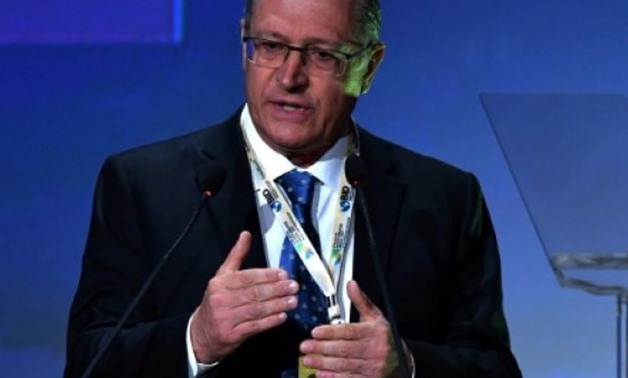
© AFP/File / by Damian WROCLAVSKY | Sao Paulo Governor Geraldo Alckmin is expected to run for Brazil's presidency next year as the candidate of the centrist Brazilian Social Democratic Party
BRASÍLIA - 9 December 2017: With leftist former president Luiz Inacio Lula da Silva and firebrand right-wing former army officer Jair Bolsonaro leading the polls, there's a gaping hole in Brazil's center ahead of presidential elections next year.
On Saturday, one of the country's most established centrist forces, the Brazilian Social Democratic Party, or PSDB, will take a first step in trying to become the missing piece of that puzzle.
The PSDB convention will choose Sao Paulo state Governor Geraldo Alckmin as its leader, effectively launching him as the party's candidate for the October 2018 polls.
He'll have a lot of catching up to do.
Faced by that hostile voter landscape, the PSDB's other big step expected soon is to quit the coalition government headed by the center-right PMDB and scandal-ridden President Michel Temer.
Temer, who took over after the impeachment of leftist president Dilma Rousseff in 2016, is mired in corruption charges and widely disliked for his attempt to push through austerity reforms. With single-digit ratings, he is the most unpopular president on record.
But will breaking from the government and naming Alckmin persuade voters that the PSDB can bring a fresh start?
- Alckmin tarnished too -
Betinho Gomes, a PSDB legislator, thinks so.
"The need for a centrist candidate who contrasts with the extreme left and right will promote alliances between several parties and Alckmin will be a key player," he said. "This scenario is made for a PSDB victory."
But while Alckmin, 65, has the party machine behind him, he may be seen as more of the same at a time when Brazilians are thirsting for something different.
So far he is polling only at a modest seven percent.
Crucially, Alckmin is alleged to have taken dirty money in the sprawling "Car Wash" scandal that has uncovered systemic embezzlement and bribery between politicians and some of Brazil's biggest companies. This is not a good time to be a graft-tainted politician in Brazil.
"He has a chance, but not much of one. No PSDB candidate is doing well in the polls and their party was hit hard by the corruption scandals," said Fernando Lattman-Weltman, an analyst at the Instituto de Ciencias Sociales.
The PSDB was the big winner in municipal elections held in 2016, but building on that in the presidential and congressional elections of 2018 will depend on the tepid economic recovery currently underway strengthening.
If that happens, the centrists will be able to argue that Brazil doesn't need any radical shift left or right. But if the recovery peters out, voter anger may leave the PSDB out in the cold.
"If the economic recovery fails, then the whole political movement (that replaced leftist Rousseff) will fail," Betinho said.


Comments
Leave a Comment